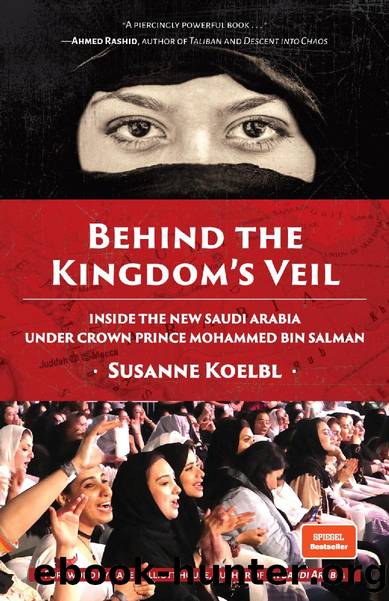Behind the Kingdom's Veil by Susanne Koelbl

Author:Susanne Koelbl [Koelbl, Susanne]
Language: eng
Format: epub
ISBN: 9781642503456
Publisher: Mango Media
Published: 2020-07-22T15:00:52+00:00
The royalsâ depiction of the unification wars: The nationâs founder, Ibn Saud, was considered an honest, humble man.
Direct descendants receive a fixed allowance from birth. It ranges between $200,000 and $270,000 per month for his children. Grandchildren get $27,000, great-grandchildren $13,000, while their children get a piddling $8,000. When princes and princesses marry, they are given between one and three million dollars for the construction of a residence. The portfolio of the royal allowances adds up to two billion dollars, a little less than 1 percent of the countryâs annual budget of around $240 billion.
In 1996, Prince Al-Waleed bin Talal spilled the beans about the top-secret list of royal allowances in a confidential conversation with William Fowler, the former US ambassador in Riyadh. Fowler cabled a memo on the subject to his superior. Fifteen years later, WikiLeaks published the confidential State Department correspondenceâas part of the Cablegate documentsâfor all the world to read.
Fowlerâs report revealed further details about the royalsâ internal rivalriesâfor example, how a handful of princes in top government jobs received much more money than the rest. Huge sums are allocated outside of the official budget, flowing toward, for example, development projects around the two Holy Mosques in Mecca and Medina, which, as Prince Al-Waleed revealed, amounted to $5 billion per year at the time.
Thatâs not all. Of the national daily oil production of eight million barrels, one million barrels were set aside, the proceeds from the sale of which were divided up between five or six princes, as Al-Waleed told the US ambassador. In the mid-1990s, that amounted to $20 million per day.
Saudi Arabia didnât always have a reputation for corruption. The nationâs founder, Ibn Saud, was considered an honest, humble man who led a puritanical life following Wahhabi principles. It was well known that, when he was traveling through the country and saw a poor man, he would sometimes stop, get out of the car, and press a gold coin into the manâs hand. Ibn Saud died in 1953. âKing Saudâwho succeeded Ibn Saud on the throneâand his brother King Faisalâwho in turn succeeded himâare also reported to have been squeaky clean.â
Back then, the nation was developing quickly, and the oil boom demanded rapid change. King Faisalâwho took the throne in 1964âfounded various institutions to run the country: a defense ministry, an interior ministry, a health ministry. He left the job of running the ministries to his brothers.
But the oil boom encouraged greed: day-to-day corruption on the part of hospital directors, construction bosses, and top state officials who would buy hospital beds, heavy machinery, and office equipment at normal market rates then charge the administration sky-high prices for the goods and pocket the difference. For a long time, this was the way things worked here. Everyone in the hierarchy added his signature to claim his share of the contract.
Princes used to seize plots of land and register them under their names. They either took the land away from the residents outright, or they bought it for
Download
This site does not store any files on its server. We only index and link to content provided by other sites. Please contact the content providers to delete copyright contents if any and email us, we'll remove relevant links or contents immediately.
Guard Duty by Sharon Dunn(1079)
Explosive Situation by Terri Reed(957)
Truth of the Divine by Lindsay Ellis(795)
The Heart's Song by Winnie Griggs(792)
Valley of Shadows by Shirlee McCoy(779)
The Match by Sarah Adams(700)
Kill Order by Adam Blumer(640)
The Jerusalem Diamond by Noah Gordon(588)
The Prophets by Robert Jones Jr(561)
Threadly Secret by Samantha Price(500)
Dreams Interpreted by Lizzie Cornwall(497)
Closer Than She Knows by Kelly Irvin(496)
Christmas Up in Flames by Lisa Harris(486)
The Love Notes by Jennifer Griffith(481)
Girls Only! 1-4 by Beverly Lewis(455)
The Amish Widow's New Love by Liz Tolsma(450)
Explosive Situation (True Blue K-9 Unit: Brooklyn Book 4) by Terri Reed(442)
TALES OF THE CARAVAN by Wilhelm Hauff(436)
Song of Songs (Baker Commentary on the Old Testament Wisdom and Psalms) by Richard S. Hess(427)
